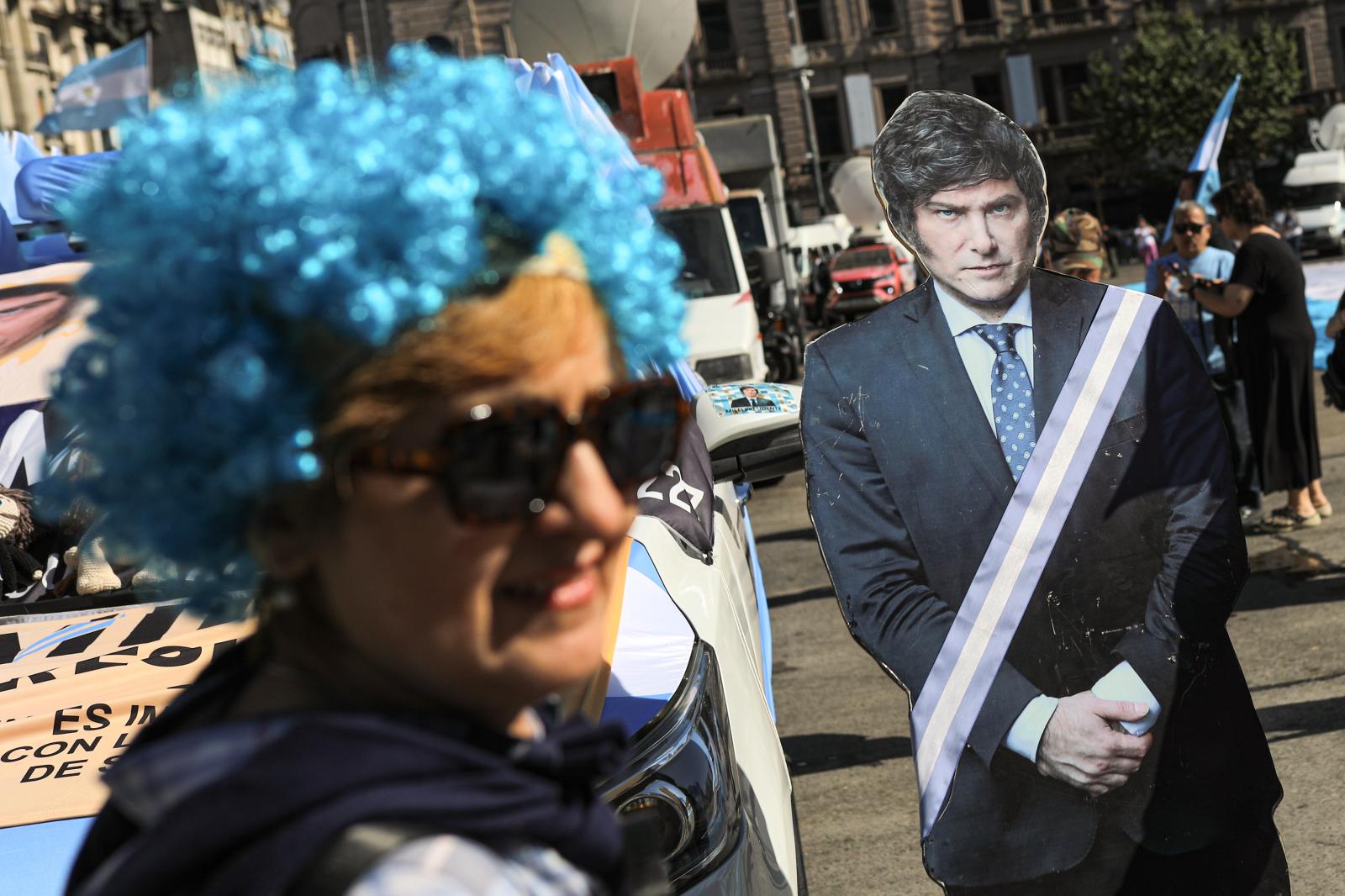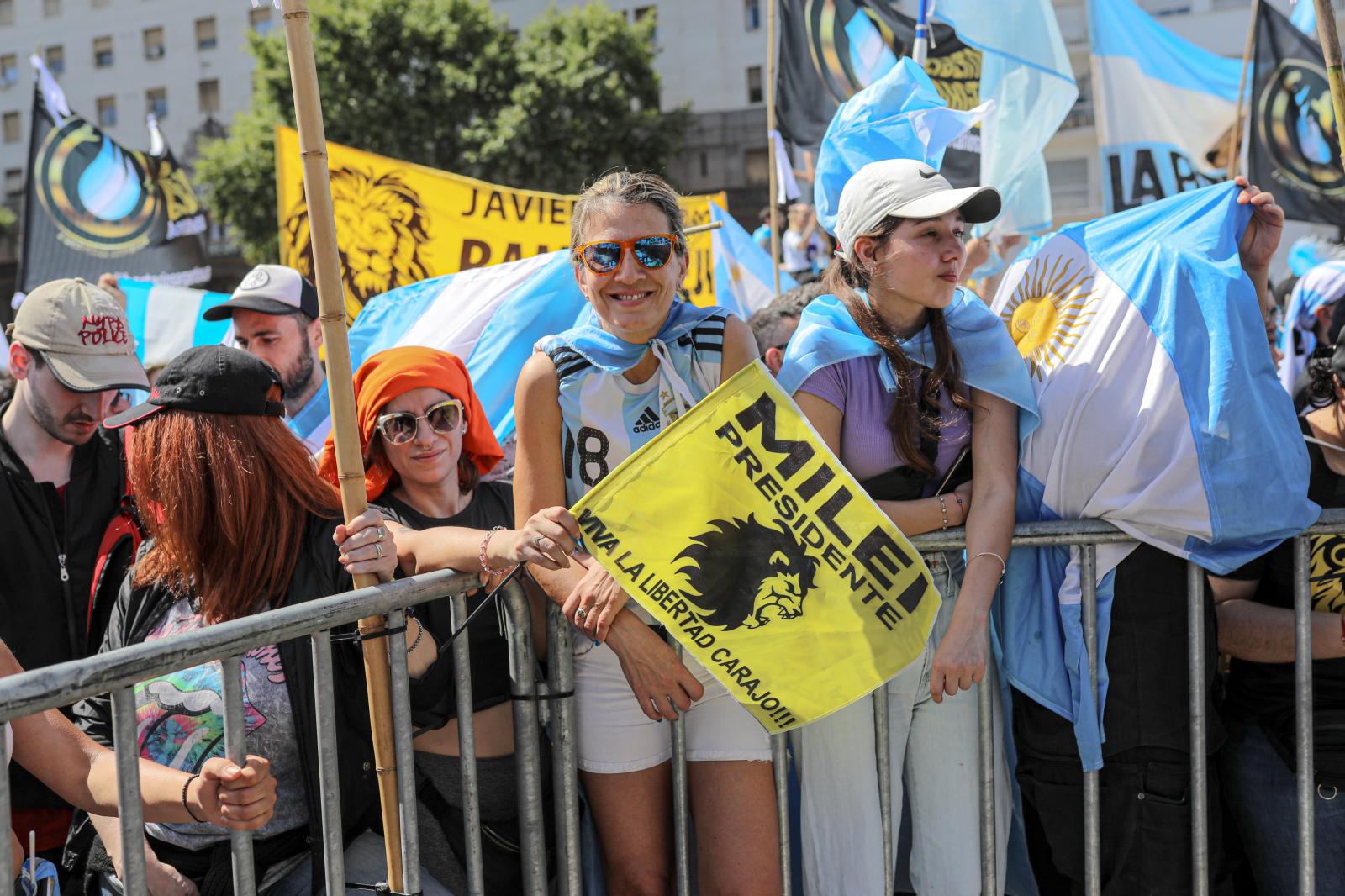News
Coming to power of Javier Milei
lucas aguayo araos
Dec 10, 2023
It marks Milei's first international trip before officially assuming office Dec. 10, following his victory in the Nov. 19 presidential elections against Economic Minister Sergio Massa.
Just a couple of years ago, the Libertarian outsider was virtually unknown in the political landscape. Transitioning from a former television personality to a political phenomenon, Milei's unexpected rise saw him triumph in August's open primary, outpacing Massa and former Security Minister Patricia Bullrich. Despite initially finishing second to Massa in October's first-round elections, Milei clinched victory in the runoff, surpassing his opponent by a 12-point margin.
Known for his eccentric style and controversial statements, Milei has drawn parallels to former US President Donald Trump and Brazil's Jair Bolsonaro. He has opposed abortion and described sex education as a Marxist plot to destroy the traditional family unit.
The “madman,” as he is frequently called, has said he was in favor of the sale of human organs, and legalizing the free carrying of weapons. He also questioned the veracity of climate change. His unconventional views have stirred debate, but voters, disillusioned by an economic crisis, have rallied behind Milei.
“People didn't really vote for him because of what he thinks about abortion,” said Pablo Touzon, a political scientist and director of political consulting firm Escenarios. “Argentines voted for him despite these proposals because people are desperately trying to get out of the economic crisis for which they blame the current government.”
In Argentina, where inflation has soared to 140% and the peso has depreciated 90% in four years, Milei pledged drastic measures. His proposed initiatives include cutting public spending, streamlining ministries and adopting the US dollar as the national currency, a move questioned by experts like Touzon, who explained that dollarizing the economy could mean a further devaluation of the peso and a weaker currency would push up prices and inflation.
The libertarian economist has also vowed to abolish the central bank because he said it is an intrinsically “corrupt” institution that “finances the political caste.”
Milei's appeal lies particularly with the frustrated -- predominantly young male voters critical of government corruption and mismanagement contributing to Argentina's dire economic state.
Touzon noted that many of those voters have never witnessed the country's growth since the 2000s.
In one of the most liberal countries in Latin America, where feminist movements have been significant and massive, some of its conservative proposals have been poorly received.
Popular targets for his attacks include women, the LGBTQ+ community and even Pope Francis. Many of Milei’s supporters view the vote as a rejection of the status quo rather than an endorsement of his proposals.
“Milei cannot think that what happened to him is an endorsement of his entire agenda because it is not. It is more than anything a rejection of the government,” said Touzon.Milei and his vice president have downplayed the bloody 1976-1983 military dictatorship that ruled the country. “But you can't say that 55 percent of Argentines, who voted for Milei in the run-off race, want the dictatorship back,” said Touzon.
Concerns about Milei's governance capability persist due to his lack of experience and the lack of majority support in Congress. Forming coalitions and building consensus across political parties will become crucial for his success.
While initially adopting confrontational rhetoric during the campaign, Milei has taken a more conciliatory approach post-election. Reaching out to figures he previously criticized, such as inviting Brazilian President Luiz Inacio Lula da Silva to his inauguration, Milei wants to build diplomatic ties and project a more moderate image.
He has called the Chinese government an “assassin” and threatened to break diplomatic ties with Beijing, though he has also backtracked on that position since winning the presidency and he is starting to smooth over relations with Francis after previously criticizing the pope.
“His own ideological lithium has led him to say things that he later retracts,” said Touzon. “He has become more moderate, of course, because before he did not have the responsibility of governing right around the corner. He almost did not think that he was going to win.”
Despite a challenging path ahead, with experts like Touzon dubbing him the "candidate of the outbreak" for announcing shock solutions, Milei's political journey is unfolding against the backdrop of a nation seeking a remedy for its economic woes.
“And what better than the 'madman' to do a kind of chemotherapy, an inevitable process, to maybe start to heal?” said Touzon.
LUCAS AGUAYO ARAOS / ANADOLU AGENCY
398








